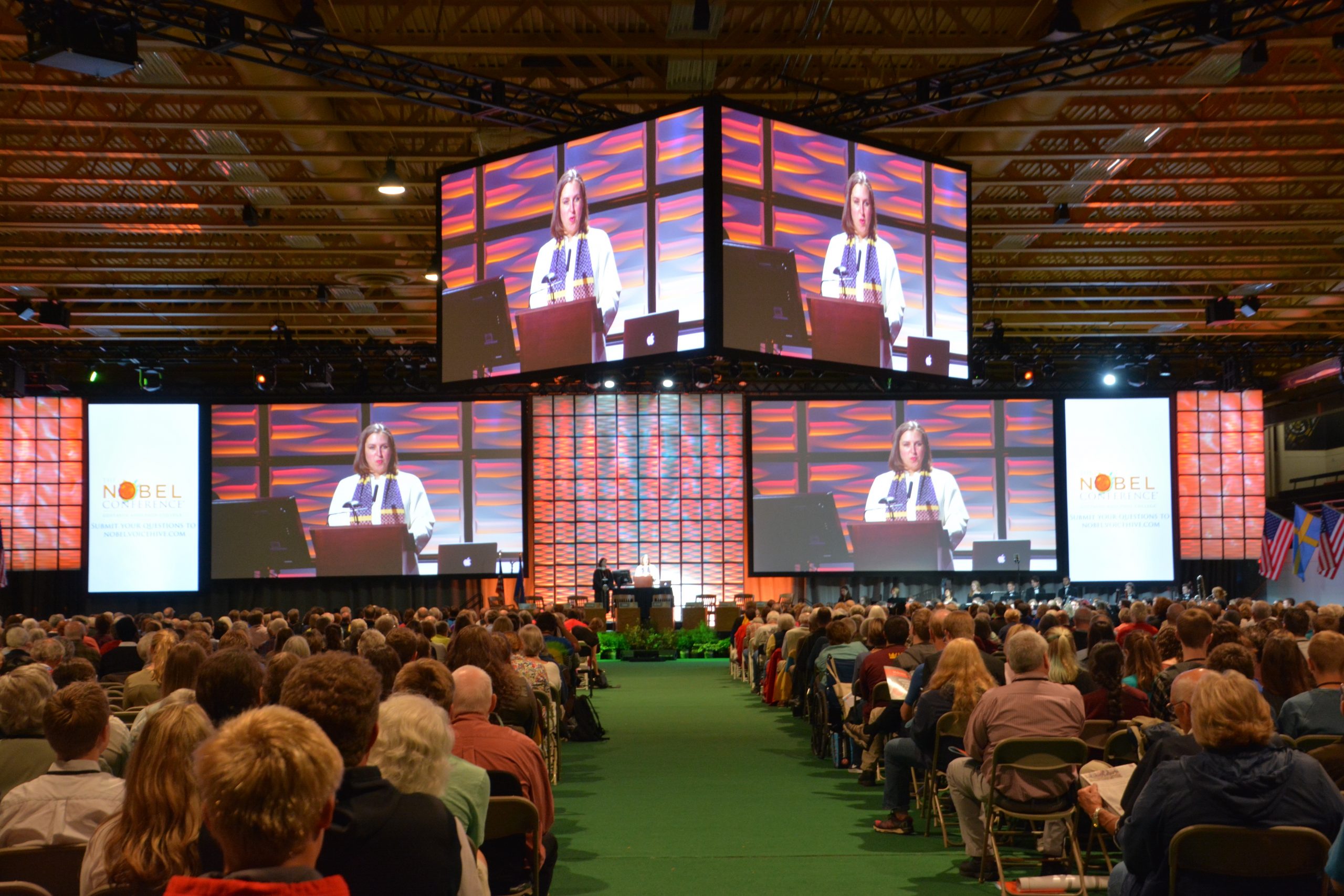One of the most notable events that Gustavus Adolphus College is fortunate to host annually is the Nobel Conference. One of the most notable events that Gustavus Adolphus College is fortunate to host annually is the Nobel Conference.
The Nobel Conference is an academic conference that aims to bring together the world’s top researchers and scholars in order to discuss modern issues focused on social and natural sciences, and their societal impact. This year’s conference was held on Tuesday, Oct. 4, and Wednesday, Oct. 5 in the Lund Arena. The theme for this year’s conference was “Reproductive Technology: How Far Do We Go?”
Traditionally no classes are held during these two days, and student admission is free as encouragement for students to attend one or several of the talks held throughout the two day event.
Additionally various students are further encouraged to attend at least one of the talks in order to complete assignments for class work, often from First Term Seminar courses.
“There is something different and revolutionary about the technologies you’re going to be hearing about…they have the potential to impact not only many people’s lives and societies, but also human life itself,” Hong said.
The opening speaker was African American Studies Professor, Ruha Benjamin, whose lectured broadly on social implications of reproductive technologies beyond the directness that is often associated only with the science of reproduction.
She touched on how scientific research is often discriminatory, with unfair practices that prohibit diverse perspectives which in turn provoke systemic racism in the scientific community.
Benjamin raised the issue of how the scientific lab is lacking broad range of diverse voices, which in turn has a domino effect on who gets to have access to reproductive technologies.
She argues how lead scientists are oblivious to how race, class, and gender do not allow certain marginalized groups to not have access to necessities, not be able to benefit from them, and not receive the treatment for diseases they need.
“The question we have to ask ourselves is this: can we channel our tool making prowess as a species to artfully work toward a more just, more equitable future, where the life of that girl child, that poor infant, that disabled kid, that black baby, are truly valued and nurtured?” Benjamin asked.
Her mission is to promote an inclusive, respectful, and attentive scientific community that develops reproductive technology that benefits all groups.
“I like how [Benjamin] brought in the social justice aspect of reproductive technology. She mentioned racial inequalities and how white noise covers that. It was really interesting,” Sophomore Yasmine Dismuke said.
Dr. Jacob Corn, Scientific Director of the Innovative Genomics Initiative at the University of California, Berkeley, gave a lecture on CRISPR Gene Editing.
The main focus of his speech was about the innovation of the CRISPR/Cas system, and its ability to edit genomes in order to cure human diseases, or aid in species conservation and plant development.
The main goal of CRISPR, otherwise known as Clustered Regularly Interspaced Short Palindromic Repeat, is to operate as DNA segments that allow the sequence to be repeated and read over again.
From there on, Cas proteins in the bacterial immune system guide the viral DNA to find and cut the infectious viruses which aids in protection.
Also, gene editing can also be used for enhancement, which is much easier than prevention because it can be applied to everybody.
“For example, there are genes that you can edit in the body that will prevent heart attacks, basically, so there are people who are naturally born that have these mutations…there are mutations you can make that can make people more muscular.. HIV resistant,” Corn said.
Corn’s main goal is to research about genome editing technologies in order to find a cure for genetic diseases.
Sophomore Taylor Kmiech described her experience as an impactful one, especially listening to many insightful remarks she does not hear about in her normal classes.
“I liked being able to have a chance to learn about information I wouldn’t get, otherwise with my major,” Kmiech said.
Along with these two strong opening lectures, other noteworthy speakers at the Conference were Marsha Saxton, Alison Murdoch, Diana Blithe, Charis Thompson, and Jad Abumrad.
Aside from Gustavus students who attended the conference, high school students from the local area also came, along with various spectators from the public.
The entire Gustavus community was unified as brilliant minds presented their scientific ideas, raising questions and discussing life-changing ideas that will be important for the future.
